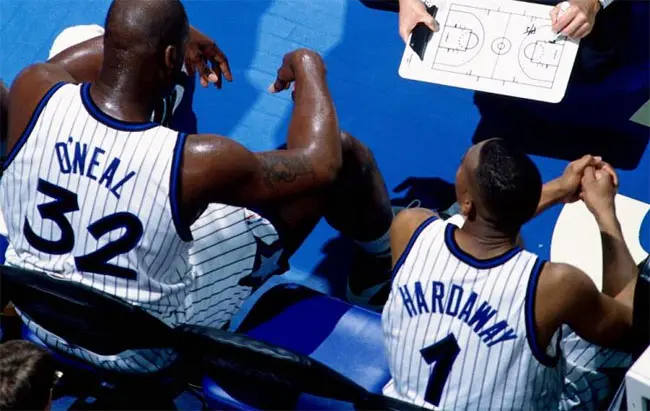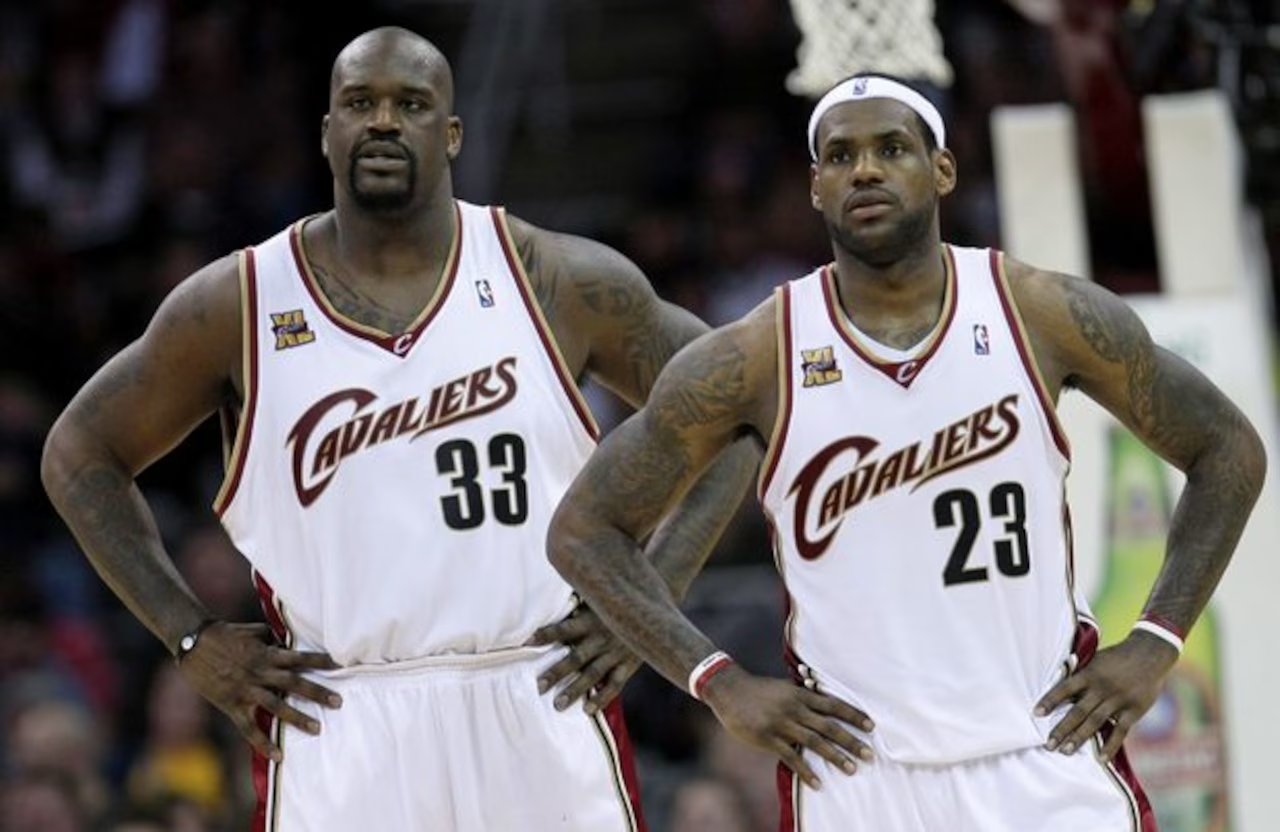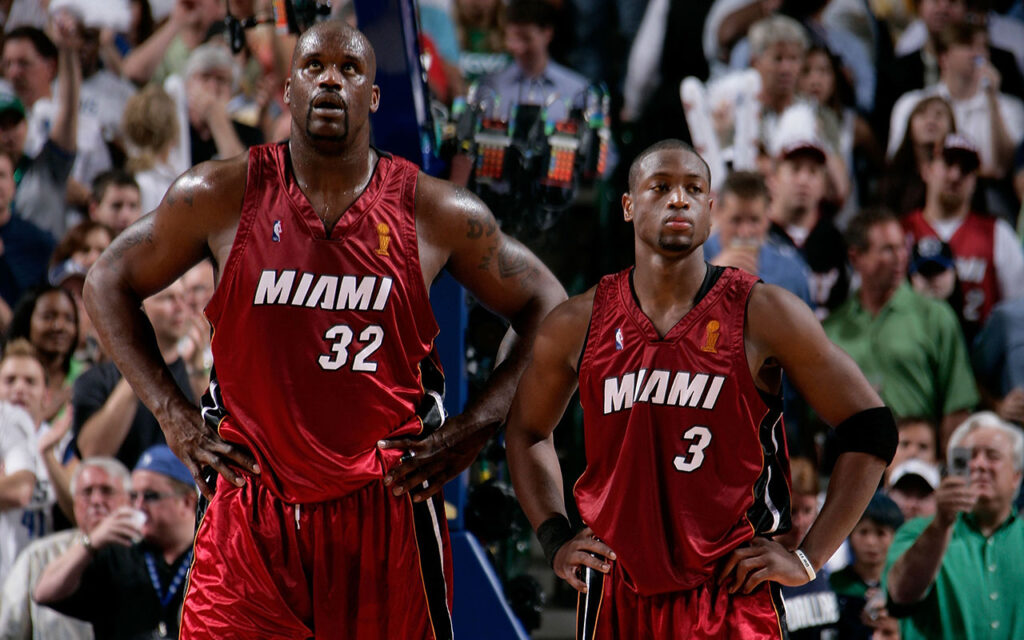
Shaquille O’Neal’s career reads like a basketball time capsule, spanning three decades and several NBA dynasties. The Hall of Fame center has played with and against some of the greatest players to ever grace the hardwood. In a recent interview, O’Neal offered a rare, personal assessment of the superstars he’s teamed up with—putting their talents in perspective through the lens of basketball royalty.
“Penny [Hardaway] was a young Magic Johnson and I was a young Kareem [Abdul-Jabbar],” said O’Neal when asked to break down the differences between the stars he played with. “Kobe was a young Michael Jordan before he became Michael Jordan. And LeBron [James] is both of them combined. And D-Wade (Dwyane Wade) was Kobe when he was coming into his own. I’ll just put it like that.”
For fans of the game, these comparisons are more than name drops—they are loaded statements from one of the most dominant big men the league has ever seen. O’Neal’s perspective is not just anecdotal; it’s deeply informed by years of playing alongside some of the greatest guards and wings in NBA history.
Penny Hardaway: Showtime 2.0 in Orlando

When Shaq entered the league in 1992 as the No. 1 overall pick by the Orlando Magic, he was immediately paired with Anfernee “Penny” Hardaway—a flashy, tall point guard with court vision and charisma that drew instant comparisons to Magic Johnson. Together, they formed one of the most electrifying duos of the 1990s. O’Neal was the physical force in the paint, while Hardaway dazzled with no-look passes, smooth jumpers, and slashing drives.
Although their time together was brief, they led the Magic to the 1995 NBA Finals, cementing their status as one of the most promising young tandems of that era. O’Neal’s comparison to Magic and Kareem speaks to what could have been a dynasty had they stayed together longer.
Kobe Bryant: Greatness Forged Through Fire

After leaving Orlando for Los Angeles in 1996, O’Neal’s career reached another level when he joined forces with a young Kobe Bryant. Though their relationship was famously turbulent, their on-court success was undeniable. The duo won three consecutive championships from 2000 to 2002, with Shaq dominating the paint and Kobe evolving into a fearless scorer and clutch performer.
“Kobe was a young Michael Jordan before he became Michael Jordan,” O’Neal said. The comparison is both flattering and accurate—Kobe’s relentless work ethic, competitiveness, and skill set drew consistent parallels to Jordan throughout his career. O’Neal watched and contributed to Bryant’s transformation firsthand, helping shape the player who would go on to score 81 points in a single game and win five NBA championships.
LeBron James: The Hybrid Superstar

By the time O’Neal joined the Cleveland Cavaliers in 2009, he was in the twilight of his career—but it gave him the chance to play with a young LeBron James, who was just entering his prime. “LeBron is both of them combined,” O’Neal said, referring to Bryant and Jordan.
This statement carries immense weight. LeBron’s combination of size, strength, court vision, scoring ability, and basketball IQ makes him a unique figure in NBA history—one who has challenged the notion of what a “complete player” looks like. O’Neal’s remark puts LeBron in the rarest air, highlighting his ability to blend the killer instinct of Kobe with the dominance and efficiency of Jordan.
Dwyane Wade: The Rising Star

Before Cleveland, O’Neal spent several seasons with the Miami Heat, where he won his fourth championship in 2006 alongside Dwyane Wade. At the time, Wade was entering the prime of his career—and his fearless attacking style quickly made him one of the league’s top shooting guards.
“D-Wade was Kobe when he was coming into his own,” O’Neal observed. The comment reflects Wade’s growth from a young, talented guard into a true superstar, culminating in his Finals MVP performance in 2006. Shaq often credited Wade’s leadership and toughness for helping bring Miami its first NBA title.
A Unique Vantage Point

O’Neal is the only player in NBA history to have played significant roles alongside all four of these generational talents—Hardaway, Bryant, Wade, and James. His comparisons aren’t just praise—they’re historical markers that contextualize how these legends fit into the evolution of the game.
Beyond the rings and the rivalries, O’Neal’s reflections remind us that basketball greatness isn’t born in a vacuum—it’s forged through competition, collaboration, and mutual respect. And if there’s anyone qualified to make these comparisons, it’s the man who’s shared locker rooms—and championships—with the best of the best.
Conclusion: A Career Measured in Legends

Shaquille O’Neal’s comments aren’t just insightful—they’re a reminder of how rare his experience truly is. Few players in NBA history have had the privilege of standing shoulder to shoulder with so many transformative talents. Fewer still have helped shape those talents into champions. His career is not just a record of personal dominance; it’s a timeline of modern basketball’s greatest eras.
Each of the players Shaq referenced—Hardaway, Bryant, Wade, and James—represents a distinct chapter in the league’s evolution. His comparison of Penny to Magic and himself to Kareem wasn’t just nostalgic—it was symbolic of an era when the NBA was in the midst of finding its next great duo. Though the Magic never became a dynasty, they sparked excitement and possibilities that rippled through the league.
Kobe Bryant, by contrast, embodied the transition from promise to legacy. His relationship with Shaq was infamously complex, but the fire forged between them created a Lakers dynasty that defined the early 2000s. O’Neal’s description of Kobe as “a young Michael Jordan before he became Michael Jordan” is both a nod to Kobe’s talent and a subtle recognition of the role he played in pushing Kobe toward greatness.
With Dwyane Wade, the chemistry was different. There was no power struggle—just two stars at different points in their careers coming together with mutual respect. In Wade, Shaq saw the hunger and explosiveness of a young Kobe, and he responded by taking a secondary role for the first time in his career. The result was one of the most impressive Finals performances in NBA history—and another championship for both.
LeBron James was the final superstar to share the court with O’Neal, and perhaps the one who transcended comparison. Shaq calling him “both of them combined” speaks volumes. LeBron didn’t just follow in the footsteps of Jordan or Kobe—he carved his own path while channeling elements of each. Shaq’s brief time with LeBron may not have yielded titles, but it gave him a firsthand view of the future of the NBA.
Beyond the court, O’Neal’s reflections reveal his growth as a person and a teammate. Early in his career, he was the focal point—the dominant force who expected others to adapt. As the years went on, he began to appreciate different styles of leadership and talent, recognizing greatness in forms beyond brute strength or highlight-reel dunks.
His ability to step back and praise those who followed in his footsteps shows a rare humility. For someone often remembered for his charisma, bravado, and larger-than-life personality, this moment of reflection feels quiet, almost reverent. It’s the voice of a man who has nothing left to prove, speaking honestly about those who helped define his journey.
It’s also a valuable lesson for fans. In an era obsessed with “GOAT” debates and highlight comparisons, O’Neal’s perspective reminds us that greatness can take many shapes—and that it’s often more meaningful to appreciate a player for who they were in their moment, rather than who they were compared to.
In the end, Shaquille O’Neal’s legacy isn’t just about points, rebounds, or rings. It’s about presence. It’s about witnessing the emergence of greatness, recognizing it in others, and helping shape it. From Penny to Kobe, Wade to LeBron, Shaq was not just a teammate—he was a catalyst, a bridge, and a witness to history.
And perhaps that’s the most powerful part of his quote. In just a few words, he captured the lineage of excellence in the NBA—not by ranking players, but by acknowledging their unique brilliance. He didn’t separate himself from their greatness—he placed himself in the story alongside them, as both peer and pillar.

